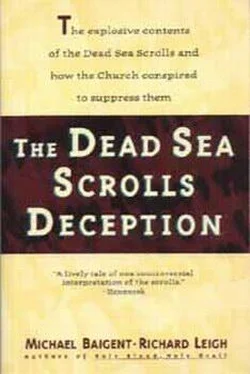Although focusing primarily on Paul, who monopolises the latter part of its narrative, Acts also tells the story of Paul’s relations with the community in Jerusalem composed of Jesus’ immediate disciples under the leadership of James, ‘the Lord’s brother’ — the enclave or faction who only later came to be called the first Christians and are now regarded as the early or original Church. In recounting Paul’s association with this community, however, Acts offers only Paul’s point of view. Acts is essentially a document of Pauline — or what is now deemed to be ‘normative’ — Christianity. Paul, in other words, is always the ‘hero’; whoever opposes him, whether it be the authorities or even James, is automatically cast as villain.
Acts opens shortly after Jesus — referred to as ‘the Nazorene’ (in Greek ‘ Nazoraion’) — has disappeared from the scene. The narrative then proceeds to describe the organisation and development of the community or ‘early Church’ in Jerusalem and its increasing friction with the authorities. The community is vividly evoked in Acts 2:44—6: ‘The faithful all lived together and owned everything in common; they sold their goods and possessions and shared out the proceeds among themselves according to what each one needed. They went as a body to the Temple every day but met in their houses for the breaking of bread…’ (It is worth noting in passing this adherence to the Temple. Jesus and his immediate followers are usually portrayed as hostile to the Temple, where, according to the Gospels, Jesus upset the tables of the moneychangers and incurred the passionate displeasure of the priesthood.)
Acts 6:8 introduces the figure known as Stephen, the first official ‘Christian martyr’, who is arrested and sentenced to death by stoning. In his own defence, Stephen alludes to the murder of those who prophesied the advent of the ‘Righteous One’, or the ‘Just One’. This terminology is specifically and uniquely Qumranic in character. The ‘Righteous One’ occurs repeatedly in the Dead Sea Scrolls as ‘ Zaddik’ 1The ‘Teacher of Righteousness’ in the scrolls, ‘ Moreh ha-Zedek’ derives from the same root. And when the historian Josephus speaks of a teacher, apparently named ‘Sadduc’ or ‘Zadok’, as the leader of a messianic and anti-Roman Judaic following, this too would seem to be a faulty Greek rendering of the ‘Righteous One’. 2As portrayed in Acts, then, Stephen uses nomenclature unique and specifically characteristic of Qumran.
Nor is this the only Qumranic concern to figure in Stephen’s speech. In his defence, he names his persecutors (Acts 7:53) — ‘You who had the Law brought to you by angels are the very ones who have not kept it.’ As Acts portrays it, Stephen is obviously intent on adherence to the Law. Again, there is a conflict here with orthodox and accepted traditions. According to later Christian tradition, it was the Jews of the time who made an austere and puritanical fetish of the Law. The ‘early Christians’ are depicted, at least from the standpoint of that stringency, as ‘mavericks’ or ‘renegades’, advocating a new freedom and flexibility, defying custom and convention. Yet it is Stephen, the first ‘Christian martyr’, who emerges as an advocate of the Law, while his persecutors are accused of dereliction.
It makes no sense for Stephen, a self-proclaimed adherent of the Law, to be murdered by fellow Jews extolling the same Law. But what if those fellow Jews were acting on behalf of a priesthood which had come to an accommodation with the Roman authorities — were, in effect, collaborators who, like many of the French under the German occupation, for example, simply wanted ‘a quiet life’ and feared an agitator or resistance fighter in their midst might lead to reprisals? 3The ‘early Church’ of which Stephen is a member constantly stresses its own orthodoxy, its zealous adherence to the Law. Its persecutors are those who contrive to remain in good odour with Rome and, in so doing, lapse from the Law, or, in Qumran terms, transgress the Law, betray the Law. 4In this context, Stephen’s denunciation of them makes sense, as does their murder of him. And as we shall see, James — James ‘the Just’, the ‘ Zaddik’ or ‘Righteous One’, the ‘brother of the Lord’ who best exemplifies rigorous adherence to the Law — will subsequently, according to later tradition, suffer precisely the same fate as Stephen.
According to Acts, it is at the death of Stephen that Paul – then called Saul of Tarsus — makes his debut. He is said to have stood watch over the discarded clothes of Stephen’s murderers, though he may well have taken a more active role. In Acts 8:1, we are told that Saul ‘entirely approved of the killing’ of Stephen. And later, in Acts 9:21, Saul is accused of engineering precisely the kind of attack on the ‘early Church’ which culminated in Stephen’s death. Certainly Saul, at this stage of his life, is fervent, even fanatic, in his enmity towards the ‘early Church’. According to Acts 8:3, he ‘worked for the total destruction of the Church: he went from house to house arresting both men and women and sending them to prison’. At the time, of course, he is acting as a minion of the pro-Roman priesthood.
Acts 9 tells us of Saul’s conversion. Shortly after Stephen’s death, he embarks for Damascus to ferret out members of the ‘early Church’ there. He is accompanied by his hit-squad and bears arrest warrants from his master, the high priest. As we have noted, this expedition is likely to have been not to Syria, but to the Damascus that figures in the ‘Damascus Document’. 5
En route to his destination, Saul undergoes some sort of traumatic experience, which commentators have interpreted as anything from sunstroke, to an epileptic seizure, to a mystical revelation (Acts 9:1-19; 22:6-16). A ‘light from heaven’ purportedly knocks him from his horse and ‘a voice’, issuing from no perceptible source, demands of him: ‘Saul, Saul, why are you persecuting me?’ Saul asks the voice to identify itself. ‘I am Jesus, the Nazorene,’ the voice replies, ‘and you are persecuting me.’ The voice further instructs him to proceed to Damascus, where he will learn what he must subsequently do. When this visitation passes and Saul regains a semblance of his former consciousness, he finds he has been stricken temporarily blind. In Damascus, his sight will be restored by a member of the ‘early Church’ and he will allow himself to be baptised.
A modern psychologist would find nothing particularly unusual in Saul’s adventure. It may indeed have been produced by sunstroke or an epileptic seizure. It could equally well be ascribed to hallucination, hysterical or psychotic reaction or perhaps nothing more than the guilty conscience of a susceptible man with blood on his hands.
Saul, however, interprets it as a true manifestation of Jesus, whom he never knew personally; and from this his conversion ensues. He abandons his former name in favour of ‘Paul’. And he will subsequently be as fervent in promulgating the teachings of the ‘early Church’ as he has hitherto been in extirpating them. He joins their community, becomes one of their apprentices or disciples. According to his letter to the Galatians (Gal. 1:17-18), he remains under their tutelage for three years, spending much of that time in Damascus. According to the Dead Sea Scrolls, the probation and training period for a newcomer to the Qumran community was also three years. 6
After his three-year apprenticeship, Paul returns to Jerusalem to join the leaders of the ‘community’ there. Not surprisingly, most of them are suspicious of him, not being wholly convinced by his conversion. In Galatians 1:18-20, he speaks of seeing only James and Cephas. Everyone else, including the apostles, seems to have avoided him. He is obliged repeatedly to prove himself, and only then does he find some allies and begin to preach. Arguments ensue, however, and, according to Acts 9:29, certain members of the Jerusalem community threaten him. As a means of defusing a potentially ugly situation, his allies pack him off to Tarsus, the town (now in Turkey) where he was born. He is, in effect, being sent home, to spread the message there.
Читать дальше












